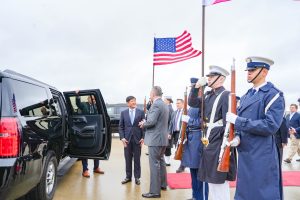President Joe Biden has reiterated the U.S. commitment to the Philippines’ security and noted the “deep friendship” between the two nations as President Ferdinand Marcos Jr. paid his first official visit to Washington.
As The Associated Press reported, the two leaders met at the White House, during which they discussed the security situation in the western Pacific, and announced a series of new economic, education, climate and other initiatives.
“We are facing new challenges and I couldn’t think of a better partner to have than you,” Biden told Marcos at the start of their meeting at the White House, according to the AP. “The United States also remains ironclad in our commitment to the defense of the Philippines, including in the South China Sea, and we will continue to support the Philippines military modernization.”
Marcos responded by saying that the U.S. alliance was essential as Philippines and the Pacific finds itself in “possibly the most complicated geopolitical situation in the world right now.”
During the visit, Biden and Marcos are expected to reach agreements on greater business engagement, as well as “military enhancements” amid shared concerns about China, a senior Biden administration official told Reuters. The Philippine leader is also slated to visit the Pentagon and meet members of Biden’s cabinet during his four-day state visit.
Marcos’ trip to the U.S. carries interesting historical echoes. It comes some four decades after his father Ferdinand E. Marcos flew to Washington in September 1982 – the one official visit that he made to the U.S. as president after declaring Martial Law in 1972. At the time, officials in the Reagan administration brushed aside human rights concerns and, as per the Washington Post, “emphasized the strategic importance of the Southeast Asian nation,” anchored by the giant Clark Air Base and Subic Naval Station. These it described as “a cornerstone of the U.S. defense posture in Asia and have assumed increasing importance with the onset of instability in the Persian Gulf.”
Some curious parallels attach this week’s visit by Marcos fils, who accompanied his father on that 1982 trip to Washington. While there were some initial concerns that past and present human rights concerns might create an obstacle to good relations with the Marcos administration, outstanding problems on this front have been shunted onto a sidetrack in the interests of a broader strategic concord. Indeed, while the U.S. no longer maintains large bases on Philippine soil, its security relations with Manila are perhaps stronger now than at any time since the era of Marcos Sr., after a series of dizzying developments over the past year.
In February, the Philippines granted the U.S. access to four more bases under the 2014 Enhanced Defense Cooperation Agreement (EDCA), bringing the total to nine, to which the U.S. has committed $100 million for various infrastructure upgrades. Marcos’ visit also comes after the U.S. and the Philippines last week completed their largest-ever joint military exercises, while the two nations’ air forces today will hold the Cope Thunder Philippines joint fighter jet training exercise for the first time since 1990. (Substitute “Taiwan Strait” for “Persian Gulf” in the above sentence from the Washington Post and the parallel becomes all the more clear.)
This rapid convergence has taken place against a backdrop of continuing Chinese incursions into Philippine-claimed areas of the South China Sea, which have produced a catalog of dangerous encounters between Chinese and Philippine vessels. The most recent incident took place on April 23, when two Chinese Coast Guard vessels blocked two Philippine patrol ships in the vicinity of Second Thomas Shoal, a Philippine-occupied feature west of Palawan island, prompting the Philippine Coast Guard to accuse them of “dangerous maneuvers” and “aggressive tactics.” The incident prompted the U.S. government to call on China to cease the “harassment and intimidation” of Philippine vessels and fishermen in the South China Sea.
The continued Chinese assertiveness in the South China Sea has prompted overlapping, though distinct, concerns in Washington and Manila. For the Philippines, the strengthened U.S. defense relationship is seen as a way of reinforcing its national sovereignty and territorial integrity in the South China Sea, while the U.S. policymaking establishment views the Philippines as a key ally in its efforts to curb and contain Chinese ambitions.
Whether or not this divergence becomes more apparent in the years to come, the Biden-Marcos summit caps off a remarkable year in Philippine-U.S. relations, in which the two sides have made up – indeed, exceeded – the ground lost under the vacillating leadership of President Rodrigo Duterte. The next year will likely bring more news in a similar vein.

































